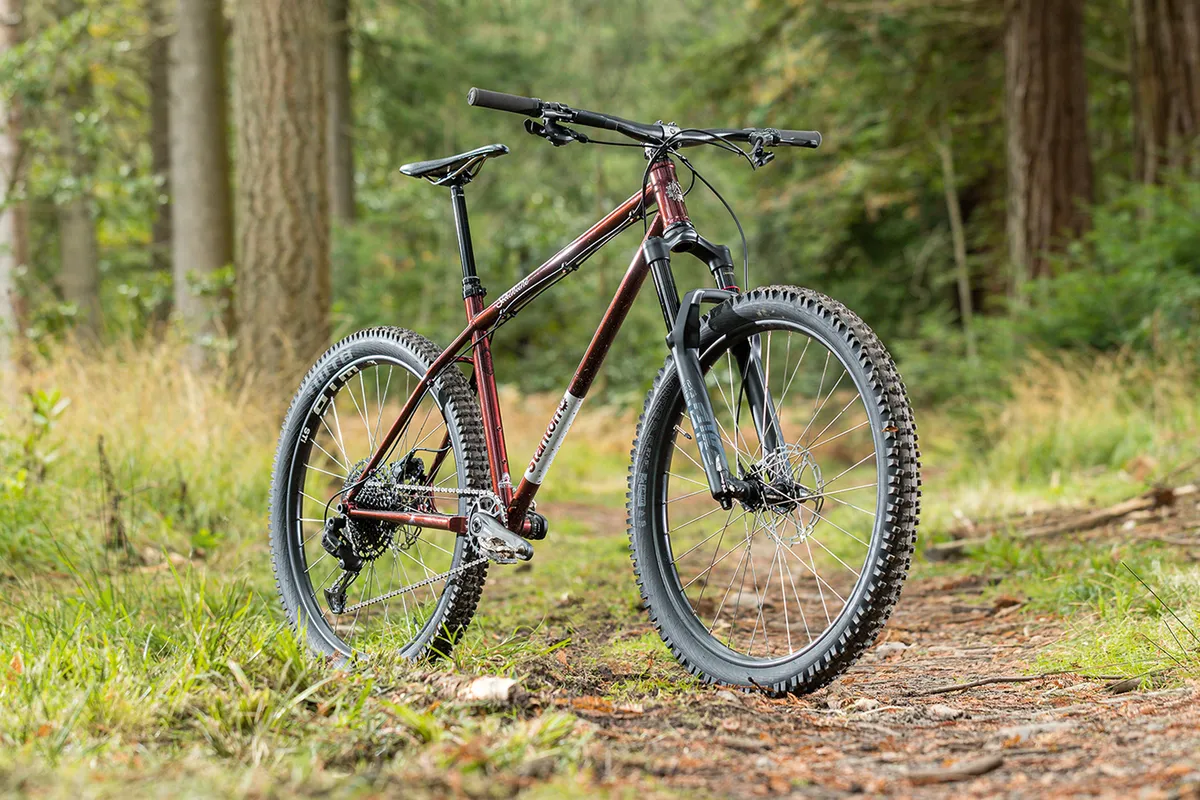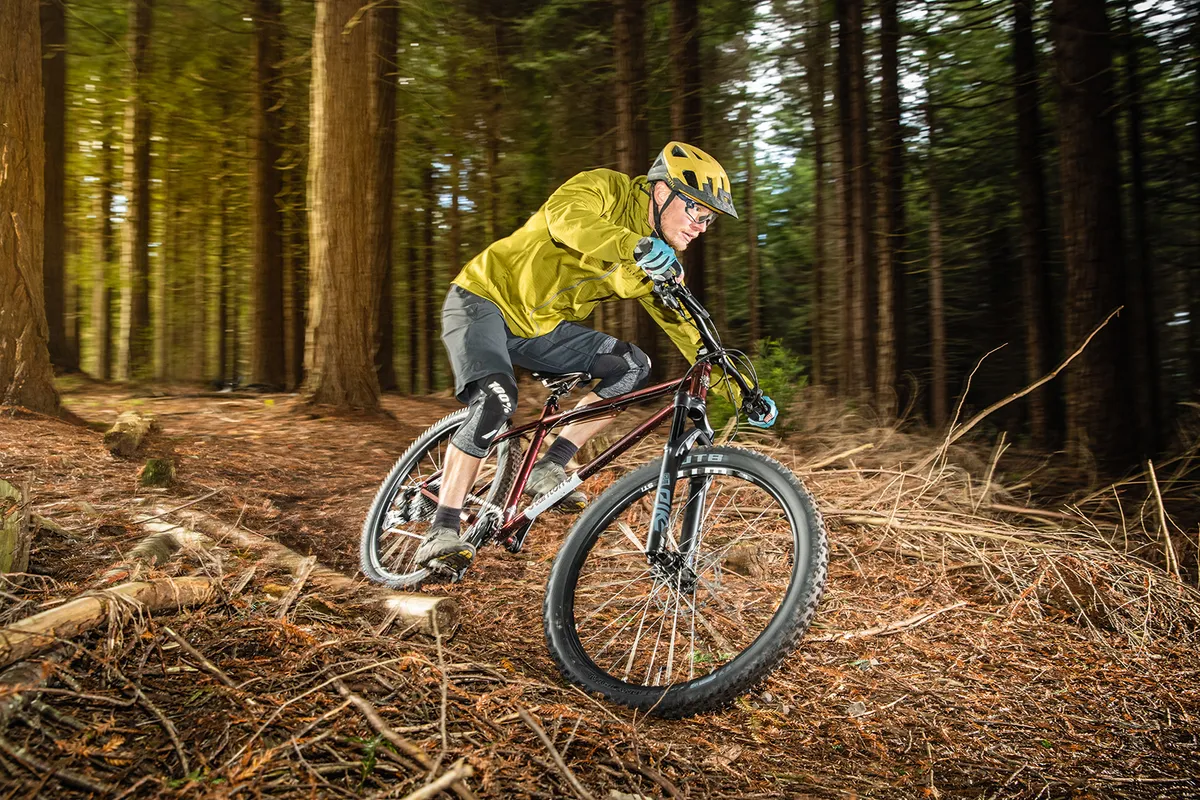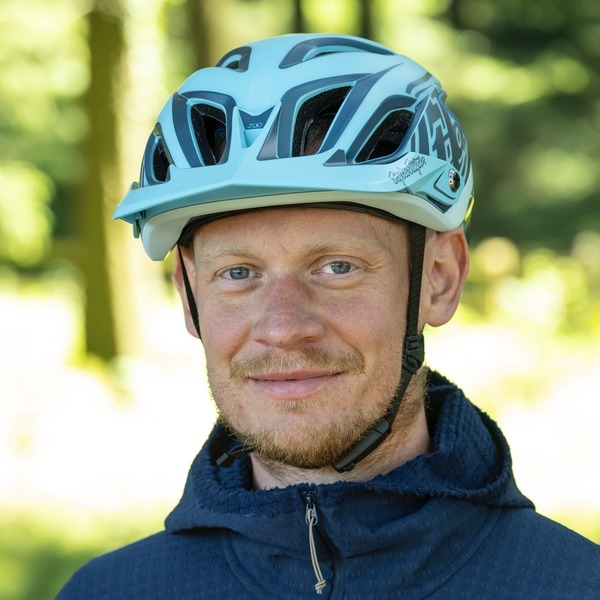Stanton has emerged, over the years, as one of the UK’s foremost boutique bike brands. Like BTR Fabrications, it focuses purely on mountain bikes, with a range of hardtails as well as a full-suspension frame.
Unusually, it offers its four hardtails in titanium as well as steel. Stanton designs, engineers, paints and finishes its frames at Stanton HQ in Derbyshire, although to save money you can choose to buy a Taiwan-built, rather than UK-built, chassis for any of its steel hardtails.
This third-generation Slackline, with its 650b wheels, is built as an all-round fun trail bike that blends the capability of slack angles with a shape that’s also comfortable for riding all day. It’s the least customisable of the bikes I had on test, with you only being able to specify the finishing touches, such as cable guides, bottle cage bosses and paint colour.
This leaves you trusting Stanton’s geometry decisions, but still allows you to tailor the bike to your needs.
A UK-built frame costs £999, while a Taiwanese one, built from triple-butted, heat-treated 4130 chromoly, is £350 cheaper at £649.
Stanton Slackline frame

Reynolds 853 steel features heavily here, with the entire front triangle, including the seat tube, made from it. The tubes are butted to reduce weight and improve the ride. The rear triangle – with its chainring and tyre-clearing plate on the driveside chainstay, brake-force-supporting strut on the non-driveside and slightly kinked seatstays – is made from Reynolds 525 steel.
The frame can take up to a 27.5 x 2.8in plus tyre, should you wish, although stock builds come with 27.5 x 2.4in rubber.
There’s a mix of internal and external cable routing, with stealth routing for a dropper post and the brake and gear outers running under the top tube.
The frame is finished with a smart metal head-tube badge. There are three sizes; I tested the 18in, which has a 460mm reach and short 430mm chainstays.
Stanton Slackline geometry
| | 16.5in | 18in | 19.5in |
|---|---|---|---|
| Seat angle (degrees) | 75.5 | 75.5 | 75.5 |
| Head angle (degrees) | 66.5 | 66.5 | 66.5 |
| Chainstay (cm) | 42.8 | 42.8 | 42.8 |
| Seat tube (cm) | 42 | 45.7 | 49.5 |
| Top tube - virtual (cm) | 60 | 62.5 | 65 |
| Top tube - actual (cm) | 58.9 | 60.83 | 63 |
| Head tube (cm) | 11 | 12 | 14 |
| Bottom bracket drop (cm) | 4.8 | 4.8 | 4.8 |
| Wheelbase (mm) | 1,149 | 1,175 | 1,203 |
| Stack (cm) | 61 | 61.9 | 63.7 |
| Reach (cm) | 43.8 | 46 | 48.1 |
Stanton Slackline kit
My Slackline came with Stanton’s standard build, costing £2,550 (including the frame).
The spec includes a 140mm-travel RockShox Pike Select fork plus a SRAM SX Eagle drivetrain and Level brakes. Stanton-branded Novatec hubs with a very quick pick-up are laced to WTB i29 rims, shod with WTB Trail Boss and Vigilante tyres.
An own-brand saddle sits atop a RockShox Reverb dropper post with 175mm of travel, and the package is rounded off with a Stanton-branded cockpit.
The Slackline is also offered as a rolling chassis (£1,850) or with just the fork (£1,560). It’s a shame there isn’t a higher-spec build option, which would show off the frame even more.
Stanton Slackline ride impressions
‘Zingy’ best describes the Slackline’s ride. There’s plenty of subtlety in the bike’s feel, with just the right amount of give in the frame to prevent it being harsh, while still having the stoutness needed to muscle through rough sections of trail.
I neither felt that I was being shaken to a pulp, nor trying to control a noodle. The 2.4in tyre at the back is mounted on a wide rim, bolstering its volume – although having ridden the Stanton back to back with the Shand Shug, I'd be tempted to sling even wider tyres in to further boost speed and comfort.

Despite the geometry chart listing the head angle at 66.5 degrees, I measured it at 64 degrees, which helps account for the Slackline’s confidence-inspiring feel when descending steeper tracks.
The front wheel is placed out ahead of the bike, and the aggressive tread of the Vigilante tyre digs doggedly into the dirt. Even when fully compressed, the 140mm Pike doesn’t extend out of the head tube at a particularly steep angle, so confident, calm handling is maintained when you’re tickling the fork’s bump-stops.
At the back, the rear wheel is tucked in close to the seat tube, thanks to the short 428mm chainstays. The snappy-feeling back end complements the springiness of the frame’s steel tubes, giving the bike a lively feel through the woods.
You’d expect a hardtail to climb well, and all four bikes I had on test did, but I really appreciated the Slackline’s steep 75.5-degree seat angle, which placed my hips well over the cranks.
Steeper seat tubes can make a bike’s front triangle feel a bit cramped when seated, but the Stanton’s top tube was long enough that this wasn’t the case when pedalling up hills.
How we tested
The UK has a rich heritage of building some of the most beautiful bespoke steel bikes in the world and we wanted to celebrate that history by getting our hands on some of the most lust-worthy British-built boutique hardtails around.
Normally, we’d give each of them a score based on geometry, kit and ride quality. However, with three of the four brands offering complete customisation (and the fourth offering a choice of frames and finishing touches), we didn’t think it fair to be too critical of a bike’s shape or smoothness because these are things that you, as the customer, have the option to modify.
Instead, we’ve spent our time putting in the miles on these bikes to get to grips with the way they ride, while also discovering the options available to you and suggesting what we might keep, or change, were we lucky enough to be in the market for such a machine.
Also on test
All of the test bikes have the brands’ stock geometry. Some came with standard build kits, while others had custom specs.
Product
| Brand | stanton |
| Price | 999.00 GBP |
| Weight | 14.3000, KILOGRAM (19.5in) - without pedals |
Features
| Fork | RockShox Pike Select, 140mm (5.5in) travel |
| br_stem | Stanton, 35mm |
| br_chain | SRAM SX Eagle |
| br_frame | Reynolds 853/525 steel |
| Tyres | WTB Vigilante Light/High Grip 27.5x2.5in (f), WTB Trail Boss Light/Fast Rolling 27.5x2.4in (r) |
| br_brakes | SRAM Level, 180/160mm rotors |
| br_cranks | SRAM SX Eagle |
| br_saddle | Stanton |
| br_wheels | WTB ST i29 rims on Stanton hubs |
| br_headset | Stanton |
| br_shifter | SRAM SX Eagle |
| br_cassette | SRAM SX Eagle |
| br_seatpost | RockShox Reverb Stealth dropper |
| br_gripsTape | Burgtec |
| br_handlebar | Stanton, 780mm |
| br_availableSizes | 16.5, 18, 19.5in |
| br_rearDerailleur | SRAM SX Eagle (1x12) |


